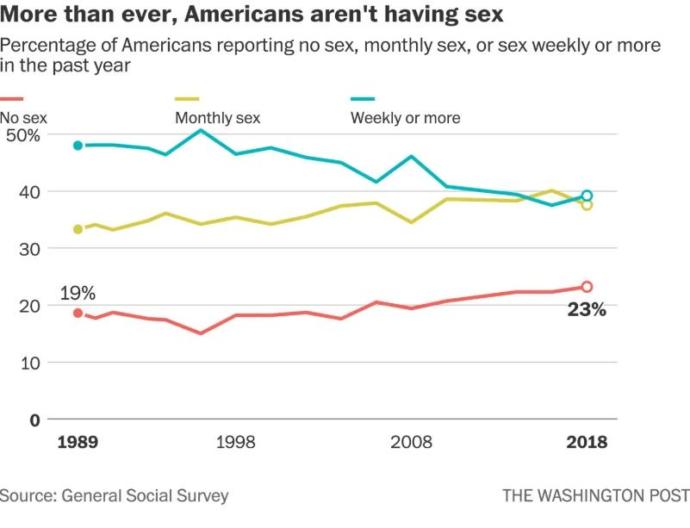
Okay, 2020 is probably going to dramatize this trend with Covid19 going on. But just 2008 - 2019 produces enough of a graph to infer the trend of how the smartphone has affected our real lives.
Sometimes I think the iPhone was a mistake, honestly. But since its introduction in 2006, the market for mobile apps was born (and all the graphs start changing exactly in 2006). Inevitably, Tinder was created in 2012 back when I was 18.
I didn't know about until maybe 2013 or 2014.
That said, the trend in behavior of US citizens at least is clear.
It seems that throughout history about 20% of the population went without sex for at least one year's time. Some percent of that 20% goes any number of consecutive years in the same situation. 80% of the population was sexually active at least once a month. And only 50% of the population was sexually active at least once a week.
Seems pretty clear to me that the 50% was people in relationships. Which is about right I'd guess. About half of people I can recall were in relationships when I was in high school, and half were not. I'd expect the trend to basically continue that way out in the real world.
The 30% were probably single people who were attractive enough to be sexually active despite single status.
And the 20% are the sad and depressed people who aren't.
Okay. But the trend on the graph has the 50% literally converging together with the 30% which suggests to me that the number of people in relationships is dropping. And I think that's probably the effect the smartphone has had on our lives.
We've become more culturally accepting of casual sex, so the number of people engaging in it has probably risen from 30% of the population to 40% of the population. And the number of people on relationships has probably dropped from 50% to 40%. Which I'd actually find believe-able; the same number of single people engaging in casual sex as there are people in relationships.
But sadly, there's been no improvement for the bottom 20% of society. It seems that 'sexual liberation' simply breaks up about 10% of relationships but it doesn't actually increase the number of sexually active people. And actually, the number of non sexually active people has risen a few percentage points, of which it has been known that these bottom 20-24%'ers are mostly males in their 20's. And we all know the story, incels and the infamous string serial killings committed by men under 30 in the 2010's, etc.
So that seems to be the effect of smartphones and the resulting sexual liberation movement, which grew out of increased interconnectedness, on our population in my opinion.
 Holidays
Holidays  Girl's Behavior
Girl's Behavior  Guy's Behavior
Guy's Behavior  Flirting
Flirting  Dating
Dating  Relationships
Relationships  Fashion & Beauty
Fashion & Beauty  Health & Fitness
Health & Fitness  Marriage & Weddings
Marriage & Weddings  Shopping & Gifts
Shopping & Gifts  Technology & Internet
Technology & Internet  Break Up & Divorce
Break Up & Divorce  Education & Career
Education & Career  Entertainment & Arts
Entertainment & Arts  Family & Friends
Family & Friends  Food & Beverage
Food & Beverage  Hobbies & Leisure
Hobbies & Leisure  Other
Other  Religion & Spirituality
Religion & Spirituality  Society & Politics
Society & Politics  Sports
Sports  Travel
Travel  Trending & News
Trending & News 
Most Helpful Opinions